While US president Donald Trump continues to makes waves, if not a storm, on the other side of the Atlantic, Europe appears to be heading into calmer waters.
Less than six months ago, many commentators and analysts viewed this part of the world as a political minefield following the Brexit vote and alarmist predictions that a string of populist leaders would be voted into power in the Netherlands, France and Germany. In the past week, however, the victory flags have been raised - and not just to celebrate the 72nd anniversary of the end of the second world war in Europe.
After the populist threat was checked during the Dutch elections in March, the outcome of the French presidential elections last weekend gave another cause for a communal sigh of relief, if not elation, in many parts of the Continent. To be sure, the German elections still loom large in September, Greece remains a festering wound at the periphery of the EU and structural problems in Italy could well evolve into a more serious eruption. Nevertheless, Emmanuel Macron’s election as president of France last week has helped to restore some confidence after the schism following the UK vote to leave the EU in June 2016.
Fears that an anti-European, anti-immigrant and anti-business president would be a disaster for France, for Europe and thus for real estate, have made way for hopes that Macron’s election will have a positive impact on the country’s real estate sector. Olivier Vellay, head of investment for continental Europe at M&G Real Estate, believes Macro’s election will act as a stimulus for the French economy and lead to much-needed labour reforms and measures to reduce the high unemployment rate currently running at 10%.
Reduced political risk
'The outcome of the French presidential election has clearly reduced the political risk in Europe and reinforced Europe’s attractiveness,’ he told PropertyEU earlier this week. ‘I think it will help restore stability in both France and the Eurozone.'
The key reform that the market would like to see is flexibility in labour laws, Karim Habra, head of France at LaSalle Investment Management, noted in a recent interview with PropertyEU's sister publication EuroProperty. 'It is unlikely to have much impact on real estate in the short term, but in the medium term it will help economic growth.'
Simplified labour laws and a reduction in corporate taxes are clear priorities for the centrist leader and will help get the French economy back on its feet, agreed M&G’s Vellay. Stronger economic growth will mean more desks in offices, a greater need for factories, business parks and so on, he added. 'Macron is also pro competition which will attract new business and create more demand for real estate,' he predicted.
The significance of Macron’s potential victory was highlighted 10 days before the election during an entertaining presentation by Andy Watson at PropertyEU's Deal of the Decade Awards ceremony in London. A former European CIO at LaSalle Investment Management, Watson has lived in Paris for more than 20 years and has watched the French capital change from being the perennial favourite of the ULI/PwC Emerging Trends report to a city stifled by political inertia and a stagnating infrastructure.
Paris fell asleep a decade ago
'Just as Berlin is now the favoured destination, Paris was the investor darling in 2006 - a huge and transparent market with freely available debt and strong annual rent indexation. But, effectively, Paris fell asleep 10 years ago. When London beat Paris in the bid to host the Olympic Games, the Parisians had to watch prosperous London grow into THE Global City of Europe. Proud Prince Jacques' (Chirac ed.) hubristic gloat to the Olympic organisers that the English had mediocre food was punished by the gods with a decade of inertia, even in the domain of gastronomy!'
That said, it hasn't been a wasted decade for the French real estate market. Indeed, it was not even negatively affected in the lead-up to the presidential elections, Vellay claims. An update by M&G on the French election shows that French markets continued to see downward yield movements even during the build-up to the election, with offices in Lyon and French industrials hardening by 55 bps and 30 bps respectively in Q1 2017.
While there is some anecdotal evidence that investors were building in opt-out clauses in the event of a win by far-right leader Marine Le Pen of the National Front or hard-left candidate Jean-Luc Mélenchon, their number appears to be limited, Vellay said. 'There was no pause in letting and investment and now that bond yields have started rising again, the favourable spread with real estate yields has been restored.'
Watson likewise has great expectations of the new French president and believes that Macron may change France – and Paris - in the same way that Angela Merkel transformed Germany - and Berlin – when she came to power just over a decade ago. During his presentation he expressed the hope that the handsome young prince will awaken the sleeping belle and restore it to its former glory. He also pointed out that the Olympic prize is again in play.
As Watson concluded in his 'fairytale of the decade', in Germany, the kiss of the princess had the power to awaken the former sleeping giant. It would be a happy ending indeed if the handsome young president could do the same in France.
Judi Seebus
Editor in Chief


































